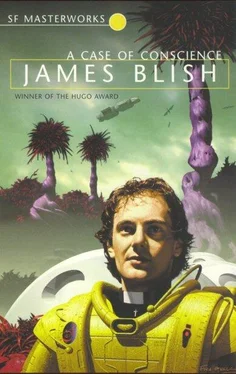“But their system works,” Cleaver said.
“So does our solid-state theory—but we work from opposite axioms,” Michelis said. “Whether it works or not isn’t the issue. The question is, what is it that’s working? I don’t myself see how this immense structure of reason which the Lithians have evolved can stand for an instant. It doesn’t seem to rest on anything. ‘Matter is real’ is a crazy proposition, when you come right down to it; all the evidence points in exactly the opposite direction.”
“I’m going to tell you,” Ruiz-Sanchez said. “You won’t believe me, but I’m going to tell you anyhow, because I have to. It stands because it’s being propped up. That’s the simple answer and the whole answer. But first I want to add one more fact about the Lithians:
“They have complete physical recapitulation outside the body.”
“What does that mean?” Agronski said.
“You know how a human child grows inside its mother’s body. It is a one-celled animal to begin with, and then a simple metazoan resembling the fresh-water hydra or a simple jellyfish. Then, very rapidly, it goes through many other animal forms, including the fish, the amphibian, the reptile, the lower mammal, and finally becomes enough like a man to be born. I don’t know how this was taught to you as a geologist, but biologists call the process recapitulation.
“The term assumes that the embryo is passing through the various stages of evolution which brought life from the single-celled organism to man, but on a contracted time scale. There is a point, for instance, in the development of the fetus when it has gills, though it never uses them. It has a tail almost to the very end of its time in the womb, and rarely it still has it when it is born; and the tail-wagging muscle, the pubococcygeus, persists in the adult—in women it becomes transformed into the contractile ring around the vestibule. The circulatory system of the fetus in the last month is still reptilian, and if it fails to be completely transformed before birth, the infant emerges as a ‘blue baby’ with patent ductus arteriosus, the tetralogy of Fallot, or a similar heart defect which allows venous blood to mix with arterial—which is the rule with terrestrial reptiles. And so on.”
“I see,” Agronski said. “It’s a familiar idea; I just didn’t recognize the term. I had no idea that the correspondence was that close either, come to think of it.”
“Well, the Lithians, too, go through this series of metamorphoses as they grow up, but they go through it outside the bodies of their mothers. This whole planet is one huge womb. The Lithian female lays her eggs in her abdominal pouch, the eggs are fertilized, and then she goes to the sea to give birth to her children. What she bears is not a miniature of the marvelously evolved reptile which is the adult Lithian; far from it: instead, she hatches a fish, rather like a lamprey. The fish lives in the sea a while, and then develops rudimentary lungs and comes to live along the shore lines. Once it’s stranded on the flats by the tides, the lungfish’s pectoral fins become simple legs, and it squirms away through the mud, changing into an amphibian and learning to endure the rigors of living away from the sea. Gradually their limbs become stronger, and better set on their bodies, and they become the big froglike things we sometimes see down the hill, leaping in the moonlight, trying to get away from the crocodiles.
“Many of them do get away. They carry their habit of leaping with them into the jungle, and there they change once again, into the small, kangaroo-like reptiles we’ve all seen, fleeing from us among the trees—the things we called the ‘hoppers.’ The last change is circulatory—from the sauropsid blood system which still permits some mixing of venous and arterial blood, to the pteropsid system we see in Earthly birds, which supplies nothing to the brain but oxygenated arterial blood. At about the same time, they become homeostatic and homeothermic, as mammals are. Eventually, they emerge, fully grown, from the jungles, and take their places among the folk of the cities as young Lithians, ready for education.
“But they have already learned every trick of every environment that their world has to offer. Nothing is left them to learn but their own civilization; their instincts are fully matured, fully under control; their rapport with nature on Lithia is absolute; their adolescence is passed and can’t distract their intellects—they are ready to become social beings in every possible sense.” Michelis locked his hands together again in an agony of quiet excitement, and looked up at Ruiz-Sanchez.
“But that-that’s a discovery beyond price!” he whispered.
“Ramon, that alone is worth our trip to Lithia. What a stunning, elegant—what a beautiful sequence—and what a brilliant piece of analysis!”
“It is very elegant,” Ruiz-Sanchez said dispiritedly. “He who would damn us often gives us gracefulness. It is not the same thing as Grace.”
“But is it as serious as all that?” Michelis said, his voice charged with urgency. “Ramon, surely your Church can’t object to it in any way. Your theorists accepted recapitulation in the human embryo, and also the geological record that showed the same process in action over longer spans of time. Why not this?”
“The Church accepts facts, as it always accepts facts,” Ruiz-Sanchez said. “But—as you yourself suggested hardly ten minutes ago—facts have a way of pointing in several different directions at once. The Church is as hostile to the doctrine of evolution—particularly to that part of it which deals with the descent of man—as it ever was, and with good reason.”
“Or with obdurate stupidity,” Cleaver said.
“I confess that I haven’t followed the ins and outs of all this,” Michelis said. “What is the present position?”
“There are really two positions. You may assume that man evolved as the evidence attempts to suggest that he did, and that somewhere along the line God intervened and infused a soul; this the Church regards as a tenable position, but does not endorse it, because historically it has led to cruelty to animals, who are also creations of God. Or, you may assume that the soul evolved along with the body; this view the Church entirely condemns. But these positions are not important, at least not in this company, compared with the fact that the Church thinks the evidence itself to be highly dubious.”
“Why?” Michelis said.
“Well, the Diet of Basra is hard to summarize in a few words, Mike; I hope you’ll look it up when you get home. It’s not exactly recent—it met in 1995, as I recall. In the meantime, look at the question very simply, with the original premises of the Scriptures in mind. If we assume that God created man, just for the sake of argument, did He create him perfect? I see no reason to suppose that He would have bothered with any lesser work. Is a man perfect without a navel? I don’t know, but I’d be inclined to say that he isn’t. Yet the first man—Adam, again for the sake of argument—wasn’t born of woman, and so didn’t really need to have a navel. Did he have one? All the great painters of the Creation show him with one: I’d say that their theology was surely as sound as their aesthetics.”
“What does that prove?” Cleaver said.
“That the geological record, and recapitulation too, do not necessarily prove the doctrine of the descent of man. Given my initial axiom, which is that God created everything from scratch, it’s perfectly logical that he should have given Adam a navel, Earth a geological record, and the embryo the process of recapitulation. None of these need indicate a real past; all might be there because the creations involved would have been imperfect otherwise.”
Читать дальше











